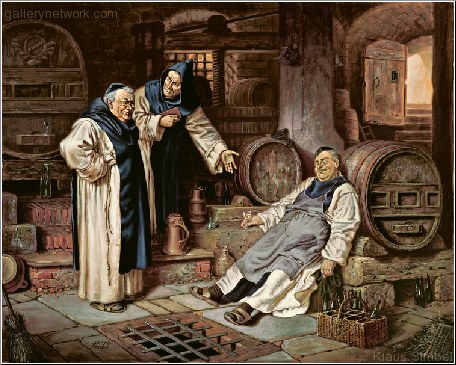Showing 4 of 20
"Look What We Have Here"
by Klaus Strubel
view biography
Academic Painter of Fine Art / Art Historian
We are in a historic deep,
cool and airy wine cellar of a European Monastery in the 19th century, in which you notice authentic details and equipment.
Brother John (on
the right) was asked to bring the wine out of the cellar for the supper time. Of course, he had to carefully taste some wines to pick out the right
sort for their meal. This responsible job made him slightly sleepy so he just wanted to take a little nap, but asleep he fell.
As Brother John
and the wine were missed by the other brothers, Brother Bartholo was sent down to look what is taking Brother John so long and, of course, he found
him happily dozing. Instead of waking him up, brother Bartholo told on him and called Brother Henry, the Prior of the Monastery to the
scene.
Observing their faces, we see that compared to the looks of brother Bartholo, Prior Henry does not deny good food and wine too, and his
mime reveals that he feels for Brother John’s situation, but now has the obligation to be strict and cannot approve such faux pas.
While I was
university student in Germany, I also studied Art History and traveled through Europe to visit historic landmarks, museums, cathedrals and famous
monasteries. I often took the opportunity to rent a boarding room in some of the famous monasteries because you could learn so much about the history
and the various fields of expertise, - especially the one that fascinated me: The making of wine and champagne.
For ages, the brothers in their
different orders have represented the highest level of culture. They were the keepers of science, education, inventions, literature, fine art, music
and developers of world famous champagne and excellent wines.
During wine tasting in their cellars, I was surrounded by historic tools and
equipment, hand carved casks and had wonderful talks with the cellarers.
These lasting impressions inspired me to preserve certain situations
in the life of the Masters of Winemaking.
The play of the feature in my works tells whole stories. Each mime in their faces, their gestures,
their hands and fingers and many more details, bring life into these captured moments. Now and then, I inject a little touch of humor in circumstances
of their life; after all, they are only human.
The artistic quality of my painting contains historic details and authentic tools the winemakers
worked with.
I want my paintings to be entertaining, conversational pieces for the art collectors and at the same time to be very
decorative.
by Klaus Strubel
view biography
Academic Painter of Fine Art / Art Historian
We are in a historic deep,
cool and airy wine cellar of a European Monastery in the 19th century, in which you notice authentic details and equipment.
Brother John (on
the right) was asked to bring the wine out of the cellar for the supper time. Of course, he had to carefully taste some wines to pick out the right
sort for their meal. This responsible job made him slightly sleepy so he just wanted to take a little nap, but asleep he fell.
As Brother John
and the wine were missed by the other brothers, Brother Bartholo was sent down to look what is taking Brother John so long and, of course, he found
him happily dozing. Instead of waking him up, brother Bartholo told on him and called Brother Henry, the Prior of the Monastery to the
scene.
Observing their faces, we see that compared to the looks of brother Bartholo, Prior Henry does not deny good food and wine too, and his
mime reveals that he feels for Brother John’s situation, but now has the obligation to be strict and cannot approve such faux pas.
While I was
university student in Germany, I also studied Art History and traveled through Europe to visit historic landmarks, museums, cathedrals and famous
monasteries. I often took the opportunity to rent a boarding room in some of the famous monasteries because you could learn so much about the history
and the various fields of expertise, - especially the one that fascinated me: The making of wine and champagne.
For ages, the brothers in their
different orders have represented the highest level of culture. They were the keepers of science, education, inventions, literature, fine art, music
and developers of world famous champagne and excellent wines.
During wine tasting in their cellars, I was surrounded by historic tools and
equipment, hand carved casks and had wonderful talks with the cellarers.
These lasting impressions inspired me to preserve certain situations
in the life of the Masters of Winemaking.
The play of the feature in my works tells whole stories. Each mime in their faces, their gestures,
their hands and fingers and many more details, bring life into these captured moments. Now and then, I inject a little touch of humor in circumstances
of their life; after all, they are only human.
The artistic quality of my painting contains historic details and authentic tools the winemakers
worked with.
I want my paintings to be entertaining, conversational pieces for the art collectors and at the same time to be very
decorative.
[1]  1 | 2 | 3 | 4 | 5 | 6 | 7
1 | 2 | 3 | 4 | 5 | 6 | 7  [20]
[20]
Copyright (C) 2003-2014 Gallery Network, Inc.

